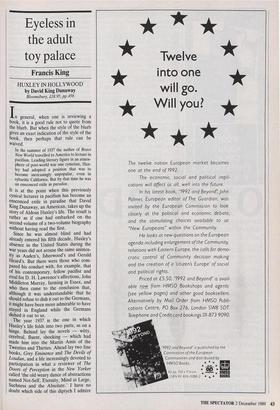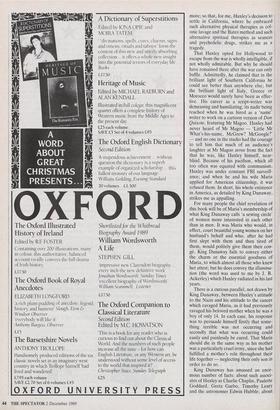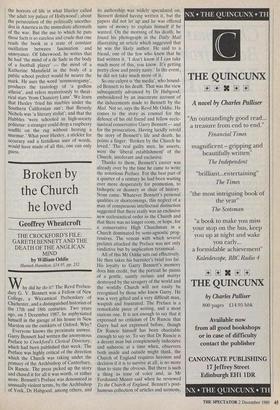Eyeless in the adult toy palace
Francis King
HUXLEY IN HOLLYWOOD by David King Dunaway
Bloomsbury, f18.95, pp.458
In general, when one is reviewing a
book, it is a good rule not to quote from the blurb. But when the style of the blurb gives an exact indication of the style of the book, then perhaps that rule can be waived.
In the summer of 1937 the author of Brave New World travelled to America to lecture in
pacifism. Leading literary figure in an atmos-
phere of post-world war one cynicism, Hux- ley had adopted a position that was to
become increasingly unpopular, even in sybaritic California. But by that time he was an ensconced exile in paradise.
It is at the point when this previously cynical lecturer in pacifism has become an ensconced exile in paradise that David King Dunaway, an American, takes up the story of Aldous Huxley's life. The result is rather as if one had embarked on the second volume of a two-volume biography without having read the first. Since he was almost blind and had already entered his fifth decade, Huxley's absence in the United States during the war years did not arouse the same animos- ity as Auden's, Isherwood's and Gerald Heard's. But there were those who com- pared his conduct with, for example, that of his contemporary, fellow pacifist and rival for D. H. Lawrence's affections, John Middleton Murray, farming in Essex, and who then came to the conclusion that, although it was understandable that he should refuse to dish it out to the Germans, it might have been more admirable to have stayed in England while the Germans dished it out to us.
The year 1937 is the one in which Huxley's life folds into two parts, as on a hinge. Behind lay the novels — witty, cerebral, fluent, shocking — which had made him into the Martin Amis of the
Twenties and Thirties. Ahead lay two fine books, Grey Eminence and The Devils of Loudun, and a life increasingly devoted to participation in what a reviewer of The Doors of Perception in the New Yorker called 'the old weary dance of abstractions named Not-Self, Eternity, Mind at Large, Suchness and the Absolute.' I have no doubt which side of this diptych I admire more; so that, for me, Huxley's decision to settle in California, where he embraced such alternative physical therapies as col- onic lavage and the Bates method and such alternative spiritual therapies as seances and psychedelic drugs, strikes me as a tragedy.
That Huxley opted for Hollywood to escape from the war is wholly intelligible, if not wholly admirable. But why he should have remained there after the war can only baffle. Admittedly, he claimed that in the brilliant light of Southern California he could see better than anywhere else; but the brilliant light of Italy, Greece or Morocco would surely have been as effec- tive. His career as a script-writer was demeaning and humiliating, its nadir being reached when he was hired as a 'name' writer to work on a cartoon version of Don Quixote, featuring Mr Magoo. Huxley had never heard of Mr Magoo — 'Little Mr What's-his-name, McGrew? McGoogle?' — and no one in the studio had the courage to tell him that much of an audience's laughter at Mr Magoo arose from the fact that he was, like Huxley himself, near- blind. Because of his pacifism, which all too often was equated with communism, Huxley was under constant FBI surveill- ance; and when he and his wife Maria applied for American citizenship, it was refused them. In short, his whole existence in America, as detailed by King Dunaway, strikes me as appalling.
For many people the chief revelation of this book will be of Maria's membership of what King Dunaway calls 'a sewing circle' of women more interested in each other than in men. It was Maria who would, in effect, court beautiful young women on her husband's behalf and who, after he had first slept with them and then tired of them, would politely give them their con- e. King Dunaway fails to convey either the charm or the essential goodness of Maria, to which almost all those who knew her attest; but he does convey the illumina- tion (the word was used to me by J. R. Ackerley) which Huxley radiated in his last years.
There is a curious parallel, not drawn by King Dunaway, between Huxley's attitude to the Nazis and his attitude to the cancer which ravaged Maria, as it had previously ravaged his beloved mother when he was a boy of only 14. In each case, his response was to persuade himself firstly that some- thing terrible was not occurring and secondly that what was occurring could easily and painlessly be cured. That Maria should die in the same way as his mother was a particularly cruel irony, since she had fulfilled a mother's role throughout their life together — neglecting their only son in order to do so.
King Dunaway has amassed an enor- mous number of facts: about such associ- ates of Huxley as Charlie Chaplin, Paulette Goddard, Greta Garbo, Timothy Leary and the astronomer Edwin Hubble; about the horrors of life in what Huxley called the adult toy palace of Hollywood': about the persecution of the politically unortho- dox in America in the immediate aftermath of the war. But the use to which he puts these facts is so careless and crude that one reads the book in a state of constant oscillation between fascination and annoyance. Of Isherwood, he writes that he had 'the mind of a de Sade in the body of a football player' — the mind of a Katherine Mansfield in the body of a public school prefect would be nearer the mark. He uses the word `nonmonogamy', produces the tautology of 'a godless atheist', and refers mysteriously to theat- rical stars 'from Chancery Lane'. We learn that Huxley 'fried his marbles under the Southern Californian sun'; that Beverly Nichols was 'a literary stylist'; and that the Hubbies 'were schooled in high-society politesse: a stranger could drop a raspberry soufflé on the rug without hearing a murmur.' What poor Huxley, a stickler for accuracy and a fastidious user of words, would have made of all this, one can only guess.












































































 Previous page
Previous page